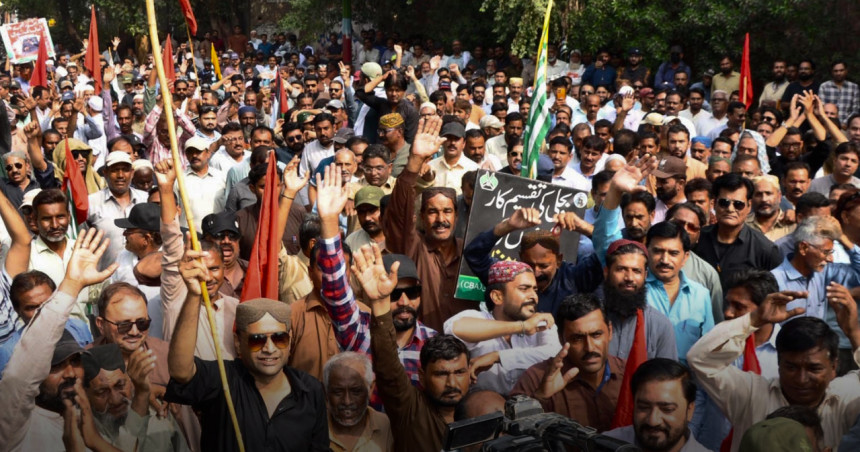Pakistan’s political instability has reached a boiling point this month, following calls by Imran Khan, the leader of Pakistan Tehreek-e-Insaf (PTI), for mass protests aimed at restoring democracy and addressing allegations of human rights violations. [1]
Pakistan is a nation historically influenced by military intervention in politics; this “final call” as Khan has put it — issued through family due to incarceration — has been the latest step in the struggle for fair governance.
In this article, we outline the events leading to this point, the response from both the state and PTI supporters, and its implications for the country’s political future.
BACKGROUND
- Imran Khan, a cricketer-turned-politician, served as Pakistan’s Prime Minister until his removal through a no-confidence motion in April 2022
- Khan, 72, attributed his ousting to a conspiracy orchestrated by the military and allegedly influenced by the US
- He cited his refusal to grant airbase access to the Americans and his growing ties with Russia
- The aftermath of his removal saw intensified political suppression; he faces almost 200 legal cases, from financial misconduct to violations of Sharī'ah
- His 9 May 2023 arrest began a new period of political unrest, as widespread protests erupted nationwide, leading to mass arrests of PTI supporters
Final call and its demands
On 24 November 2024, PTI supporters mobilised across Pakistan and abroad in response to Khan’s “final call” request.
The protest movement aimed to achieve the following:
- Secure the release of political prisoners, including Khan.
- Restore democratic norms and the rule of law in Pakistan.
- Reclaim PTI’s electoral mandate, which the party claims was stolen during February 2024 elections.
Now, it’s important to reiterate that Khan’s announcement was made under dire circumstances.
Repeated reports from his family and party allege that he has been subjected to inhumane conditions in prison, including isolation, denial of adequate nutrition, and restricted access to legal representation and communication.
Despite these challenges, he has remained steadfast, rejecting any deal to exit politics in exchange for leniency.
The state response
In anticipation of the protests and in the desire to suppress dissent, the government — led by the Pakistan Muslim League (PML-N) and supported by the military establishment — have implemented stringent measures.
These include:
- A lockdown of the capital city, Islamabad
- Arresting over 4,000 PTI supporters in the days leading up to the protests
- Restrictions on mobile services and messaging services including WhatsApp
- Threatening protesters with cancellation of national identity cards, passports, and academic degrees
- Blocking major roads and highways, particularly in PTI strongholds in Punjab and Khyber Pakhtunkhwa provinces. [2]
Video evidence circulating on social media shows clashes between protesters and law enforcement, with allegations of heavy-handed tactics used to disperse demonstrators.
Protests at home and abroad
Local PTI leaders have organised processions converging on Islamabad, despite obstacles.
Protesters have dismantled roadblocks, while authorities have reportedly targeted vehicles belonging to activists.
And the demonstrations have garnered serious international attention, with PTI supporters staging demonstrations in major cities across Europe, the United States, and Australia.
A key aim has been to draw increased awareness to human rights abuses in Pakistan and advocate for international intervention in restoring democratic governance.
Contested elections and the army’s role
The February 2024 elections marked a key point in Pakistan’s political crisis.
This is because — despite bans on using the PTI symbol and widespread repression of its leaders — PTI-backed candidates initially emerged as front-runners in exit polls.
However, a sudden halt in the transmission of results led to allegations of vote rigging. PTI claims that its candidates secured 180 seats in the National Assembly but were officially credited with only 93.
The role of the armed forces in these elections, often described as Pakistan’s “real power broker”, has drawn sharp criticism. Indeed, the military is accused of undermining democratic processes by manipulating electoral outcomes and choking dissent.
What this means for Pakistan’s democracy
The “final call” protests have resurfaced deep divisions within the country’s political and institutional frameworks.
Certainly, PTI’s mobilisation reflects public discontent, but the government’s harsh response has made it ever clearer, the challenges facing civil liberties and democratic processes.
Imran Khan’s scheduled court appearance on Wednesday, 27 November 2024 could be the straw that breaks the camel’s back; PTI supporters are hoping that sustained public pressure will compel the government to release Khan.
Concluding thoughts
The ongoing political unrest in Pakistan is a fight against entrenched authoritarianism. And it is a battle that did not begin with Imran Khan.
Certain political dynasties have sought for decades to maintain the status quo or only bring about change that is in line with foreign interests such as that of the US.
So it is clear that the outcome of these massive international demonstrations — including those outside Downing Street yesterday — will not only shape the future of PTI and Imran Khan, but also set a precedent for the role of public resistance in challenging undemocratic practices. [3]
What is urgently needed is for the international community to speak up for human rights and democratic principles. We pray for justice in Pakistan.
Source: Islam21c
Notes








Upload another article on it.
I have so much intrest in pakistan background i want to known all about it.